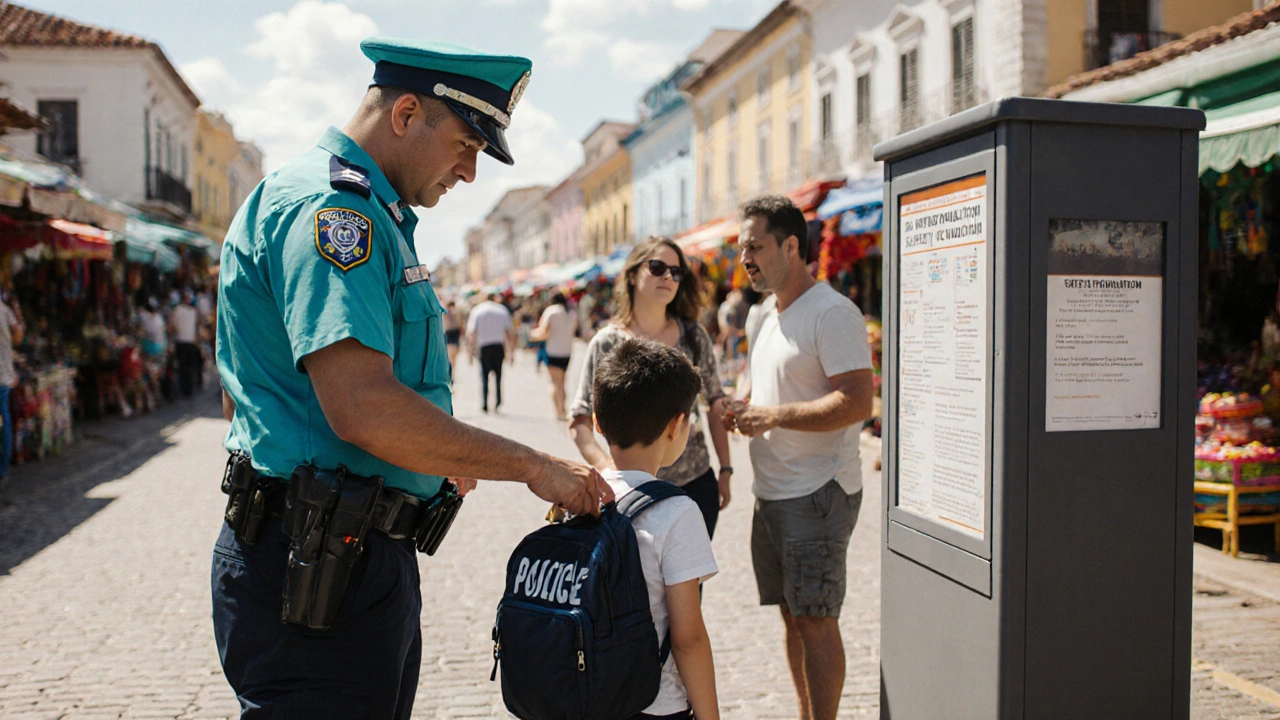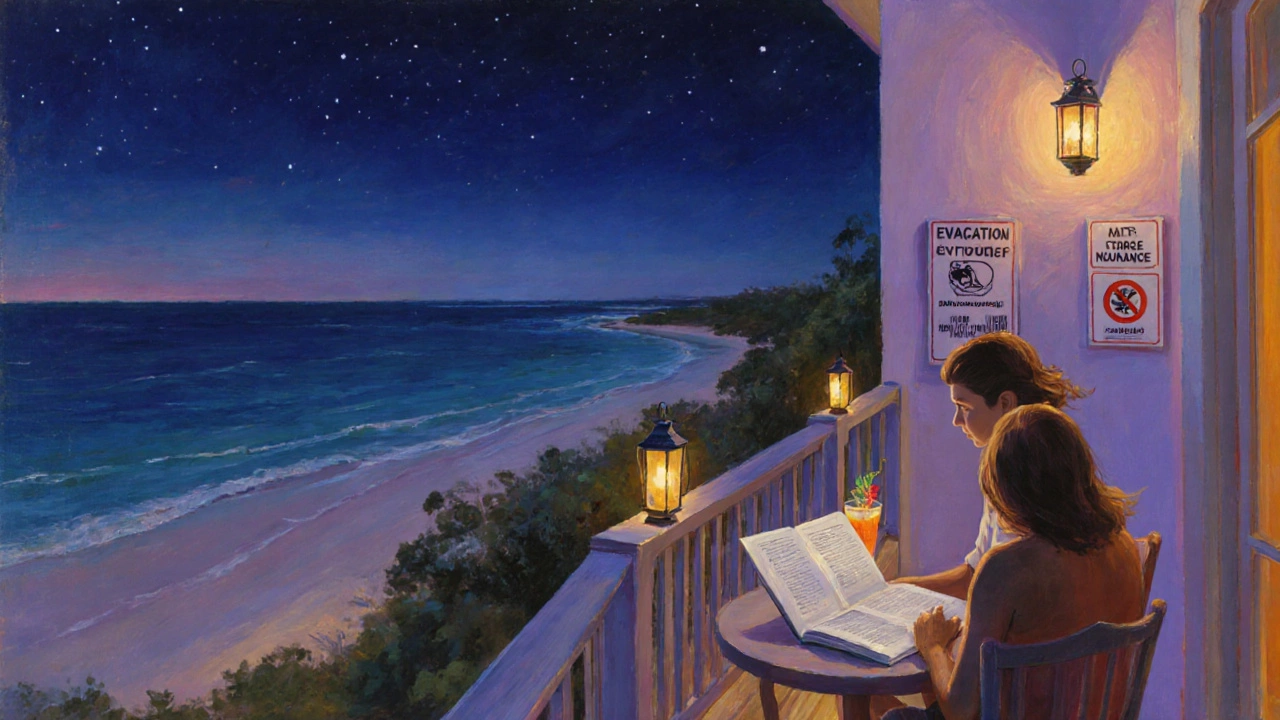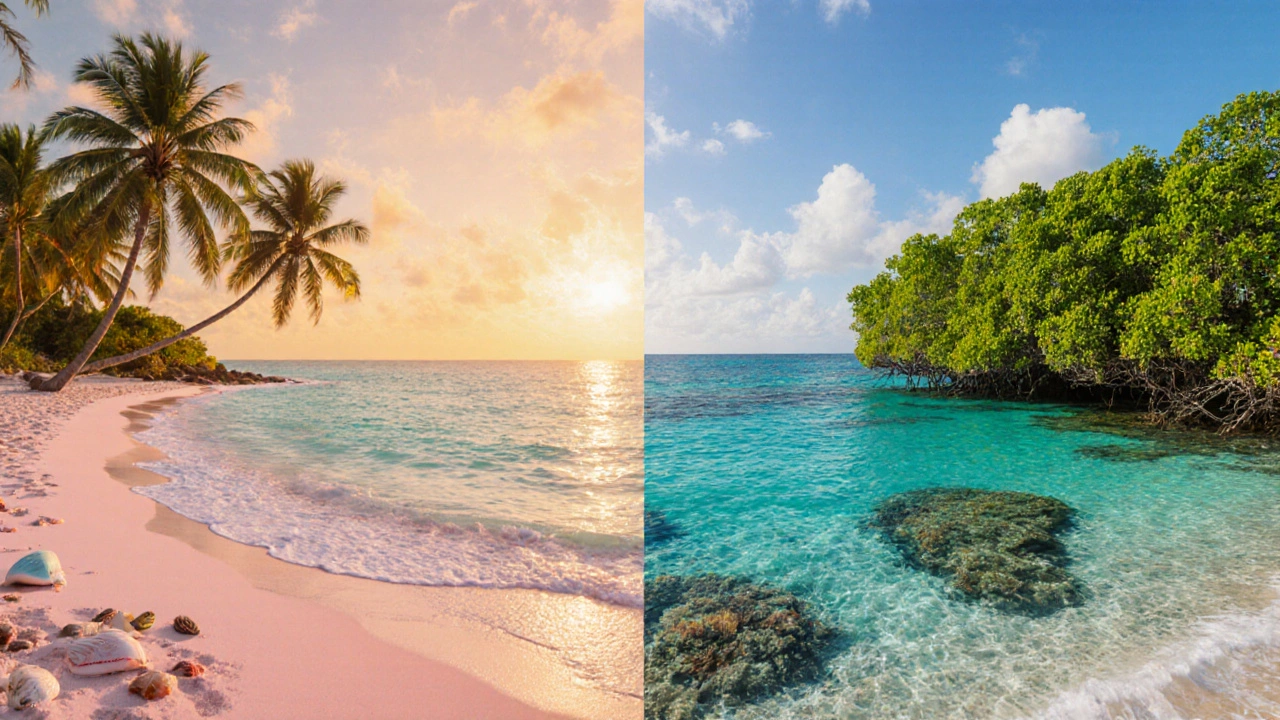Hurricane Risk Calculator
Enter your travel dates to compare hurricane risk between the Bahamas and Caribbean destinations. Data based on 2025-2030 hurricane season statistics from the article.
Important Notes
- Season Range June 1 - November 30
- Bahamas Risk 35% probability
- Caribbean Average 28% probability
When you picture a perfect beach escape, the Bahamas a chain of islands in the Atlantic known for crystal‑clear waters and pink‑sand beaches and the wider Caribbean a region of more than 7,000 islands, reefs and cays stretching from the Gulf of Mexico to the Atlantic Ocean instantly come to mind. But before you book that all‑inclusive resort, you probably wonder: which of these sunny spots feels safer for a family, a solo traveler, or a couple on a romantic getaway? This guide breaks down crime, natural hazards, health measures, and on‑the‑ground policing so you can decide with confidence.
Key Takeaways
- Both the Bahamas and the Caribbean score low on violent crime for tourists, but petty theft is higher in busy urban hubs.
- Hurricane risk peaks June - November; the Bahamas sit directly in the main Atlantic track, while many Caribbean islands sit slightly farther west.
- COVID‑19 restrictions have eased, yet vaccination requirements and testing rules differ by country.
- Tourist police are present in most major destinations, but response times vary.
- Investing in travel insurance that covers natural disasters and medical emergencies is the smartest safety move for any beach holiday.
Crime Snapshot: What Travelers Actually Face
Numbers matter, so let’s start with the data most travelers trust: Numbeo’s Crime Index. In 2024 the Bahamas posted a crime index of 28.3 (lower is safer) while the Caribbean average hovered around 31.2. The difference isn’t dramatic, but there are nuances.
Bahamas safety concerns often centre on Nassau and Freeport, where pick‑pocketing and purse snatching rise during peak cruise‑ship season. In contrast, islands like Exuma and Eleuthera maintain a reputation for “no‑crime” vibes-locals know the tourists by name and keep an eye out.
Across the Caribbean, the picture varies island by island. Jamaica’s Kingston records a higher violent‑crime score (48.5) compared with tourist‑focused spots like Montego Bay (34.1). The Dominican Republic’s Punta Cana sits at 30.7, similar to the Bahamas’ average, while the less‑touristy Grenada records just 22.5.
What the US Department of State consistently advises is simple: keep valuables out of sight, use hotel safes, and avoid walking alone after dark in poorly lit areas.
Natural Disaster Risk: Hurricanes and More
Sun, surf, and a side of storm warnings-that’s the reality of any Atlantic island. The Atlantic hurricane season runs from June 1 to November 30, with the so‑called “peak months” of August, September and October. The Bahamas sits right in the main hurricane corridor; historic storms like Dorian (2019) devastated the outer islands.
Most Caribbean islands also face hurricanes, but the risk profile shifts westward. For example, Aruba and Curacao sit outside the main belt, making them among the safest in terms of wind damage. Meanwhile, the Greater Antilles (Cuba, Jamaica, Hispaniola) see the highest landfall frequency.
The World Travel & Tourism Council reports that, between 2000‑2022, 12% of Caribbean tourists experienced travel disruptions due to storms, compared with 8% in the Bahamas. The key takeaway? Check your destination’s hurricane‑track history and choose accommodation with sturdy construction and a clear evacuation plan.

Health & Pandemic Measures: COVID‑19 and Beyond
By late 2024 most Caribbean nations lifted mandatory PCR tests for fully vaccinated visitors. The Bahamas requires proof of two vaccine doses taken at least 14 days before arrival; a negative test is still recommended for peace of mind.
Countries like Barbados, the Bahamas, and the Cayman Islands joined the “Caribbean Travel Pass” system, letting tourists upload vaccination records for a streamlined entry. The Dominican Republic, however, still asks for a rapid antigen test taken within 48 hours.
Beyond COVID‑19, mosquito‑borne illnesses (Dengue, Zika) are seasonal. The Bahamas’ Ministry of Health runs a public‑awareness campaign each summer, while Caribbean islands rely on the Pan American Health Organization’s regional alerts.
Tourist Police and On‑Ground Security
Both regions have dedicated tourist‑police units. In the Bahamas, the Royal Bahamas Police Force assigns officers to popular spots like Cable Beach and downtown Nassau. Their presence is visible, with uniforms that stand out in bright colours-easy for travelers to spot.
The Caribbean’s approach varies. Aruba’s “Tourist Police” operate 24/7 in Palm Beach, while smaller islands such as St. Kitts and Nevis rely on community policing rather than a separate unit. Response times are generally faster in the larger economies (Bahamas, Jamaica, Dominican Republic) where the budget for tourism security is higher.
Regardless of destination, keep the local emergency number saved: 911 in the Bahamas, 999 or the country‑specific number in each Caribbean nation.

Practical Safety Tips & Travel Insurance Essentials
Data and official advice are helpful, but everyday habits seal the safety deal.
- Secure your luggage: Use TSA‑approved locks and keep the zipper closed while moving through airports.
- Stay aware of your surroundings: In crowded markets, keep bags in front of you and avoid flashy jewelry.
- Know the evacuation routes: Most resorts post hurricane‑preparedness maps in lobby areas.
- Drink safe water: Bottled water is cheap and widely available; avoid tap water unless you’re sure it’s filtered.
- Buy comprehensive travel insurance: Look for policies that cover trip cancellation, hurricane‑related delays, and medical evacuation. Companies like Allianz and World Nomads rate “high‑risk” Caribbean coverage at about 5‑7% of the trip cost.
When you compare policies, verify coverage limits for “Acts of God” (hurricanes) and ensure the insurer has a reputation for fast claims processing-especially important if you’re traveling during the high‑risk months.
Decision Guide: When to Choose the Bahamas vs. Another Caribbean Destination
After scanning crime stats, storm risk, health protocols, and police presence, you can line up the two choices based on personal priorities.
| Factor | Bahamas | Average Caribbean |
|---|---|---|
| Crime Index (Numbeo 2024) | 28.3 | 31.2 |
| Hurricane Landfall Probability (2025‑2030) | 0.35 (35 %) | 0.28 (28 %) |
| COVID‑19 Entry Requirement (Vaccinated) | Vaccination proof, optional test | Varies: test required in D.R., no test in most others |
| Tourist Police Presence | Dedicated units in major towns | Present in larger islands; community policing elsewhere |
| Travel‑Insurance Premium Increase (Hurricane Season) | ~6 % of base price | ~5 % of base price |
If you value a compact archipelago with English‑speaking locals, easy US dollar use, and a strong tourist‑police presence, the Bahamas edges out the wider Caribbean-especially for families with kids.
Conversely, if you’re chasing a less‑touristy vibe, want to avoid the Atlantic hurricane belt, or prefer Spanish‑ or Dutch‑speaking culture, islands like Aruba, Curacao, or Barbados may feel safer for you.
Mini FAQ - Your Safety Questions Answered
Is the Bahamas more dangerous than the Caribbean?
Overall crime levels are comparable. The Bahamas has a slightly lower Numbeo Crime Index, but petty theft spikes in Nassau during cruise‑ship peaks. The Caribbean’s risk varies island‑by‑island, with some destinations safer and others less so.
What is the best time of year to visit for safety?
Travel between December and May avoids the hurricane season entirely. If you must go later, book accommodation with a solid storm‑proof plan and buy insurance that covers hurricanes.
Do I need travel insurance for a beach vacation?
Yes. Look for policies that cover medical emergencies, trip cancellation, and natural‑disaster interruptions. Even a short 7‑day stay can be jeopardized by a sudden storm.
Are there any health risks specific to the Bahamas?
Mosquito‑borne illnesses like Dengue appear mainly from June to October. Using insect repellent and staying in air‑conditioned rooms reduces risk. COVID‑19 rules are now minimal for fully vaccinated travelers.
How helpful are tourist police in the Caribbean?
Their presence varies. Aruba, the Bahamas, and the Dominican Republic have dedicated units with English‑speaking officers. Smaller islands rely on local police who are friendly but may have slower response times. Always keep the local emergency number handy.
Armed with these facts, you can choose the spot that feels safest for your style. Whether you unwind on a Bahamian sandbar or sip a rum punch in a Caribbean cove, a little preparation goes a long way toward a worry‑free vacation.
